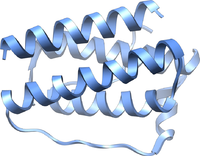
Photo from wikipedia
Neuronal development in the human cerebral cortex is considerably prolonged compared with that of other mammals. We explored whether mitochondria influence the species-specific timing of cortical neuron maturation. By comparing… Click to show full abstract
Neuronal development in the human cerebral cortex is considerably prolonged compared with that of other mammals. We explored whether mitochondria influence the species-specific timing of cortical neuron maturation. By comparing human and mouse cortical neuronal maturation at high temporal and cell resolution, we found a slower mitochondria development in human cortical neurons compared with that in the mouse, together with lower mitochondria metabolic activity, particularly that of oxidative phosphorylation. Stimulation of mitochondria metabolism in human neurons resulted in accelerated development in vitro and in vivo, leading to maturation of cells weeks ahead of time, whereas its inhibition in mouse neurons led to decreased rates of maturation. Mitochondria are thus important regulators of the pace of neuronal development underlying human-specific brain neoteny. Description Metabolism sets neuronal development pace The pace of neuronal development varies between species, and the relatively slow development of the human brain may help allow its exceptional complexity. Iwata et al. propose that the pace of neuronal development depends on the rate of metabolic activity in mitochondria. Human and mouse neurons exhibited distinct paces of development in culture correlated with the tricarboxylic acid cycle and oxidative activity in mitochondria. Manipulations to increase oxygen consumption rates and tricarboxylic acid cycle activity in human cells increased the rate of neuronal development. Slowing metabolic rates in mouse neurons slowed neuronal maturation. Thus, metabolic rates in mitochondria appear to somehow help set the speed of neuronal development. —LBR Mitochondria are important regulators of the pace of neuronal development underlying human-specific brain maturation. INTRODUCTION During embryonic development, the temporal sequence of events is usually conserved throughout evolution, but it can occur at very different time scales depending on the species or cell type considered. The human cerebral cortex is characterized by a considerably prolonged timing of neuronal development compared with other species, taking months to years to reach maturity compared with only a few weeks in the mouse. The resulting neoteny is thought to be a key mechanism enabling enhanced function and plasticity of the human brain. Human and nonhuman cortical neurons cultured in vitro or xenotransplanted into the mouse brain develop along their species-specific timeline. This suggests that species-specific developmental timing is controlled by cell-intrinsic mechanisms, but these remain essentially unknown. RATIONALE Metabolism and mitochondria are key drivers of cell fate transitions in many systems, including the developing brain. Here, we tested whether they could be involved in the species-specific tempo of cortical neuron development and human brain neoteny. We developed a system of genetic birth-dating to label newly born neurons with high temporal and cellular resolution, and directly compared the development of human and mouse cortical neurons over time. We thus profiled, across time and species, mitochondria morphology, gene expression, oxygen consumption, and glucose metabolism. Next, we used pharmacological or genetic manipulation of human or mouse neurons to enhance or decrease their mitochondria function, and determined the consequences on the speed of neuronal development. RESULTS We found that mitochondria are initally low in size and quantity in newborn neurons, and then grow gradually as neurons undergo maturation following a species-specific timeline. Whereas in mouse neurons, mitochondria reach mature patterns in 3 to 4 weeks, they only do so after several months in human neurons. We next measured mitochondria oxidative activity and glucose metabolism in human and mouse developing cortical neurons. This revealed a species-specific timeline of functional maturation of mitochondria, with mouse neurons displaying a much faster increase in mitochondria-dependent oxidative activity than human neurons. We also found that human cortical neurons displayed lower levels of mitochondria-driven glucose metabolism than did mouse neurons at the same age. Finally, we tested whether mitochondria function affects neuronal developmental timing. We performed pharmacological or genetic manipulation of human developing cortical neurons to enhance mitochondria oxidative metabolism. This led to accelerated neuronal maturation, with neurons exhibiting more mature features weeks ahead of time, including complex morphology, increased electrical excitability, and functional synapse formation. Similar treatments on mouse neurons also led to faster maturation, whereas inhibition of mitochondria metabolism in mouse neurons led to a decrease in developmental rates. CONCLUSION Our work identifies a species-specific temporal pattern of mitochondria and metabolic development that sets the tempo of neuronal maturation. Accelerated human neuronal maturation using metabolic manipulation might benefit pluripotent stem cell–based modeling of neural diseases, which remains greatly hindered by protracted neuron development. Tools to accelerate or decelerate neuronal development could allow testing of the impact of neuronal neoteny on brain function, plasticity, and disease. Mitochondria metabolism sets the tempo of neuronal development. Mitochondria dynamics and metabolism display species-specific timelines during cortical neuron development. In newborn neurons, mitochondria are small in number and metabolic activity, and then increase gradually during neuronal maturation. Enhanced mitochondria metabolism in human neurons leads to accelerated maturation, including increased neurite complexity, excitability, and synaptic function. Decreased mitochondria metabolism in mouse neurons leads to decelerated neuronal maturation.
Journal Title: Science
Year Published: 2023
Link to full text (if available)
Share on Social Media: Sign Up to like & get
recommendations!